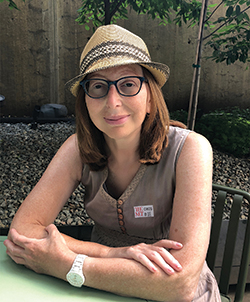HER2+ Advanced Breast Cancer Survivor
Survivor Finds Giving Back Highly Rewarding
 Victoria Goldberg was diagnosed with HER2 positive, ER positive and PR positive invasive ductal carcinoma when she was 44. She beat it. Then nine years later, she was diagnosed with Stage IV metastatic breast cancer. Today, she uses her experience to help other women with metastatic breast cancer through SHARE Cancer Support.
Victoria Goldberg was diagnosed with HER2 positive, ER positive and PR positive invasive ductal carcinoma when she was 44. She beat it. Then nine years later, she was diagnosed with Stage IV metastatic breast cancer. Today, she uses her experience to help other women with metastatic breast cancer through SHARE Cancer Support.
When I was first diagnosed, I didn’t have any symptoms. Five months before the cancer was discovered, I had a mammogram and sonogram that were clean. I was visiting my gynecologist to get a renewal on a prescription when she did a breast exam. She could feel a lump in my right breast that was close to the surface. She said it could be anything, but she wanted to check it out. She sent me for a new mammogram and a sonogram and did a needle biopsy.
The pathology report came back showing that the lump was cancerous. I was diagnosed with early-stage breast cancer on Valentine’s Day in 2005. It was a 1 cm invasive ductal carcinoma. I had triple positive breast cancer, which is HER2 positive, ER positive and PR positive. I naively thought having the positives was better. But, in 2005, a diagnosis of HER2 positive breast cancer carried a poor prognosis.
First, I had a lumpectomy, but the margins did not come back clear. I was going to need another surgery. A new surgeon was willing to do another lumpectomy, but I opted for a mastectomy with immediate reconstruction. The whole process for both surgeries took about a month.
My husband is an economics professor, and he used his skills to research my cancer. He also went to the bookstore and bought several books for me to read about cancer. When reading one of those books, I felt like the author was writing directly to me.
It was evident I would need more treatment, so we met with several oncologists. At that time, a new targeted therapy drug was considered a game changer in the treatment of HER2 positive metastatic breast cancer. Multiple doctors told us this new targeted therapy drug would be great for my type of cancer, but it wasn’t approved yet for early stage and they were unwilling to give it a try.
A friend gave me the name of a doctor who she heard was one of the best in treating breast cancer. It was the author of the book I’d been reading. I was shocked! I met with him, and he thought I would be a good candidate for the new treatment. He agreed to give it to me off label. Not long after I started this drug, it was approved for early-stage breast cancer.
After healing from my mastectomy, I had eight treatments of dose-dense chemotherapy every two weeks. The first four treatments were with a standard chemotherapy combination. The other four consisted of a different chemotherapy combined with the targeted therapy I had wanted to try. After finishing chemotherapy, I did a weekly infusion of just the targeted therapy for 14 more months. Since I was ER positive and HER2 positive, I started on hormonal treatments.
I went on with my life. I didn’t think about cancer. I actually forgot about it and started living life. But then I started having indigestion and stomach issues. I saw my oncologist in February 2014. He ordered a CT, and the results showed that the cancer had returned and metastasized to my liver and bones.
A biopsy of the tumor showed it was the same composition as my first diagnosis: HER2 positive, ER positive and PR positive. On the exact day – Valentine’s Day – of my diagnosis nine years prior, I was diagnosed as having Stage IV metastatic breast cancer. I was horrified.
I started a new treatment with a combination of drugs that had been tested in a large clinical trial. The combination included chemotherapy and two targeted therapy drugs. It was common for many oncologists to take patients off of the chemotherapy after six months, but continue with the targeted therapies. However, my doctor said that in his 45 years of clinical experience, he saw better outcomes if the patient stayed on the chemotherapy as long as it was working and it was still tolerated. Every three weeks, I would go in for an infusion. Within six months, the tumor was gone and the bone metastases had healed. I’ve been on this protocol ever since.
I’ve managed many side effects. I lost my hair. I developed terrible neuropathy, and I’m not steady on my feet now. I developed a pleural effusion (a fluid buildup around my lungs) as a result of one of the chemotherapy drugs. I lost my eyelashes and eyebrows. Without eyelashes, my eyes get very dry. I tried having my eyebrows tattooed with microblading while I was on chemotherapy but it didn’t take. I recommend having this done before starting chemotherapy.
Depression is a major problem for women with metastatic breast cancer. When I had to quit my high-powered job, I became depressed for two years. Once I saw that the treatment was working, I felt like there would be a tomorrow. I want to help others with breast cancer, and especially those with metastatic breast cancer, to understand that there is hope.
I found support through SHARE Cancer Support, and it changed my life. Now I volunteer for their helpline to talk to women about breast cancer. Giving back is very rewarding. It gives my life meaning.


